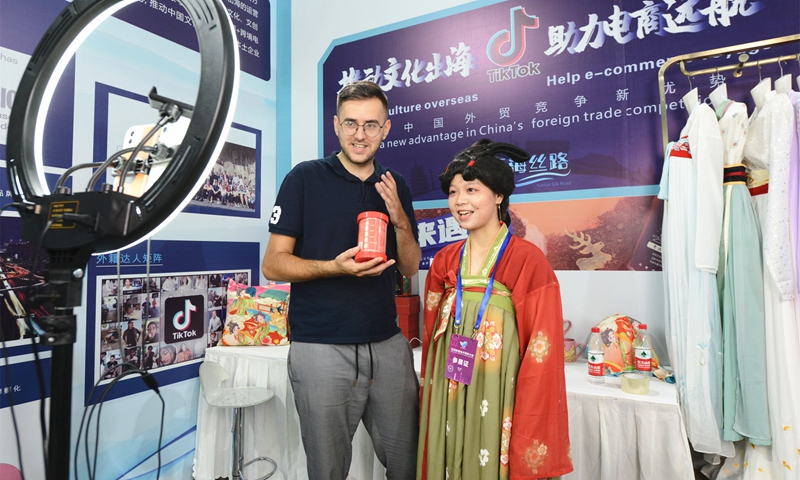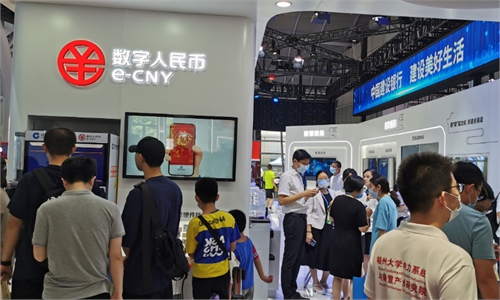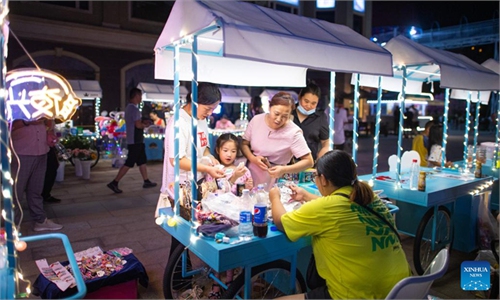China ramps up efforts to bolster H2 consumption, with consumer expos, incentives
Consumer expos, policy support to ensure faster growth: experts

Livestreamers introduce products to online audiences during the sixth Global Cross-border E-commerce Conference in Zhengzhou, Central China's Henan Province, on August 8, 2022. Photo: VCG
China has been intensively holding consumption exhibitions and handing out vouchers to bolster consumer spending prior to the traditional peak season of September and October. Amid such efforts, experts said consumption will continue to rebound in the second half of the year, with growth of retail sales expected to exceed that seen in the first six months given effective control of the latest sporadic COVID-19 flare-ups.
Just as the second China International Consumer Products Expo concluded in South China's Hainan Province recently, the sixth Global Cross-border E-commerce Conference opened on Monday in Zhengzhou, capital of Central China's Henan Province.
During the three-day event, more than 200 domestic and foreign companies will exhibit and sell over 10,000 kinds of products, including specialties from Northwest China's Xinjiang region and North China's Inner Mongolia region, according to a report on a local government website.
In the meantime, preparation for the 5th China International Import Expo is being carried out in an orderly manner, with more than 270 Fortune Global 500 companies and industry leaders having signed up for the event that will be held in November, Shanghai Mayor Gong Zheng said at a press briefing on Monday.
Supported by a variety of consumption exhibitions, the recovery in consumer spending is expected to accelerate in the second half, with the growth rate even exceeding that seen in the first six months, Pan Helin, an economics professor at Zhongnan University of Economics and Law, told the Global Times on Monday.
After COVID-19 was put under effective control in major cities like Shanghai, the growth rate of retail sales swiftly quickened to 3.1 percent year-on-year in June, reversing declines in April and May.
To stimulate spending, China has also rolled out a raft of policy incentives. Local governments across the country, including Beijing, North China's Tianjin Municipality and Central China's Hubei Province, are handing out more consumption coupons to entice consumers to open up their wallets and helping businesses survive and thrive.
Starting on Monday, the Beijing Economic-Technological Development Area began to issue vouchers worth 100 million yuan ($14.79 million) in total, which can be used for buying cars, meals and movies, among others, according to a statement on the government's official WeChat account.
According to the China Passenger Car Association, a total of 1.77 million passenger cars were sold in July - usually a slow season for the industry - an increase of 17 percent year-on-year, underscoring the effectiveness of policy incentives in spurring consumer confidence.
As the Mid-Autumn Festival and the National Day holidays approach, tourism, physical retail and the catering sector will lead the recovery, Pan said, while noting that uncertainties persist due to recent COVID-19 resurgences in Sanya, Hainan Province and Yiwu, East China's Zhejiang Province.
A meeting of the Political Bureau of the Communist Party of China Central Committee held on July 28 urged efforts to consolidate the upward trend of economic recovery so as to keep the economy running within an appropriate range, and strive for the best possible outcome.
The meeting stressed that macro policies should play an active role in expanding demand, and fiscal and monetary policies should effectively make up for the lack of social demand.
Meanwhile, a recent State Council executive meeting called for everything possible be done to spur spending, starting from big-ticket consumer goods, while support policies for industries in difficulty such as catering, retail, tourism and transportation will be fully implemented.
The authorities also focus on the need to stabilize the job market and increase consumers' disposable income, especially for low-income families, to raise their spending power, Jennifer Ye, PwC Chinese mainland consumer markets leader, told the Global Times in a recent interview.
In addition, Ye said the government should establish specific regulations to build a safe consumption environment to comprehensively boost consumer confidence, including safe shopping venues, product quality and consumer rights protection.



